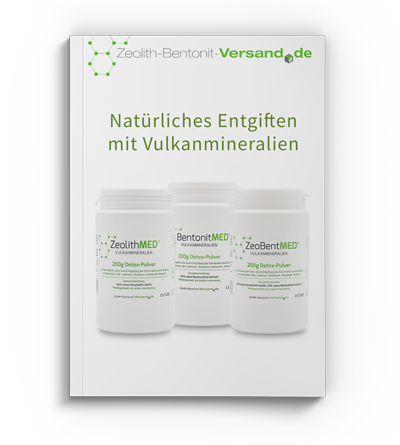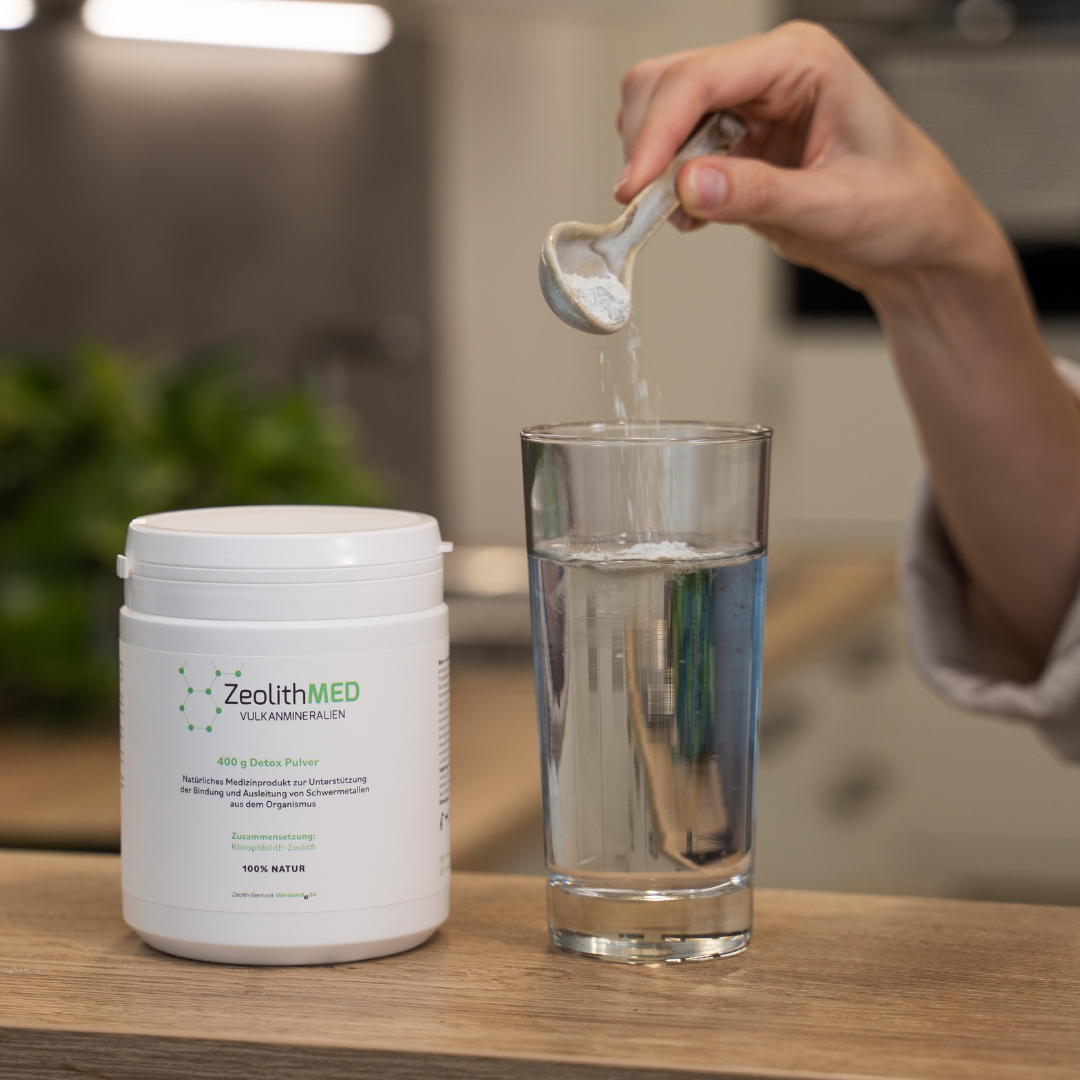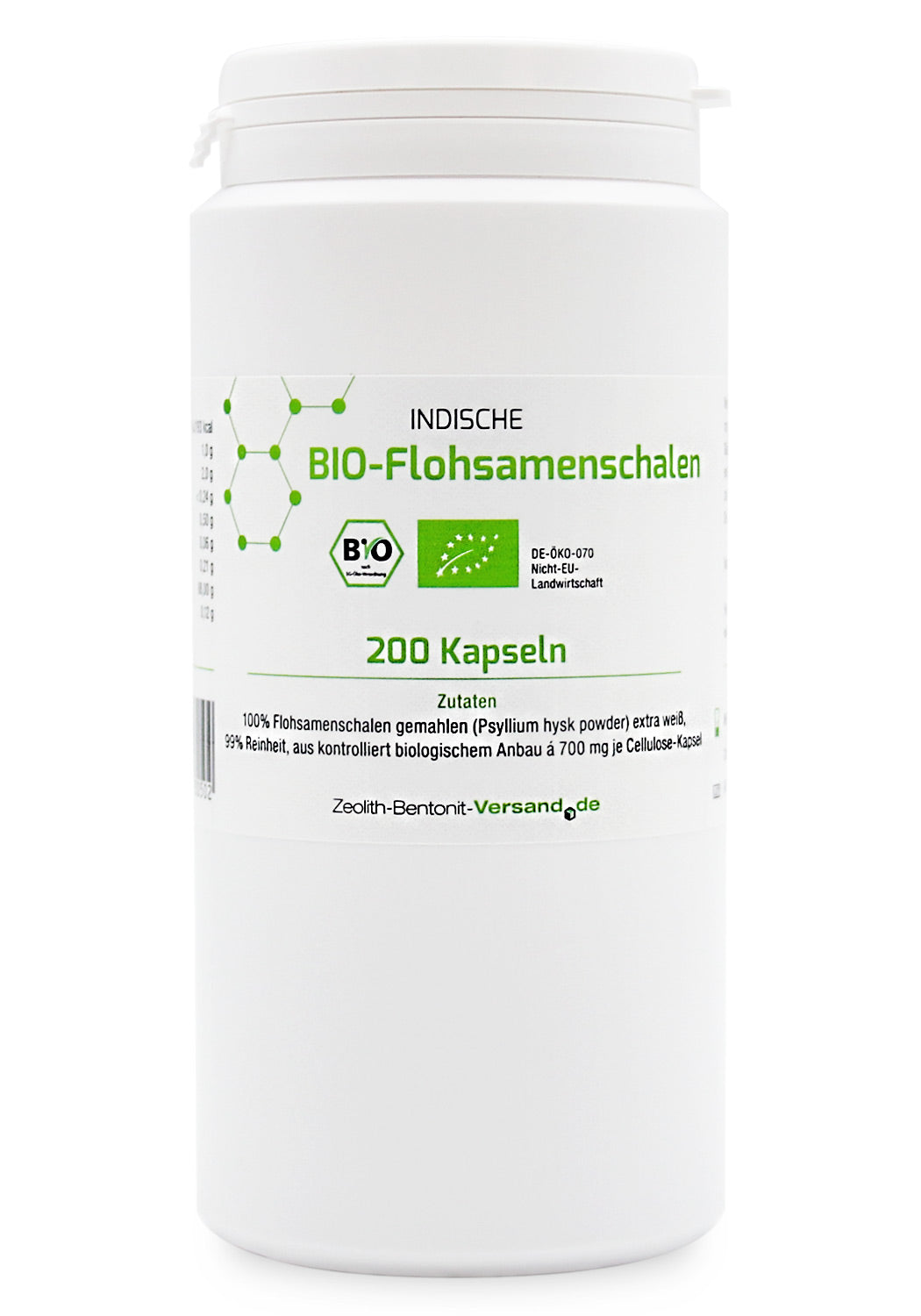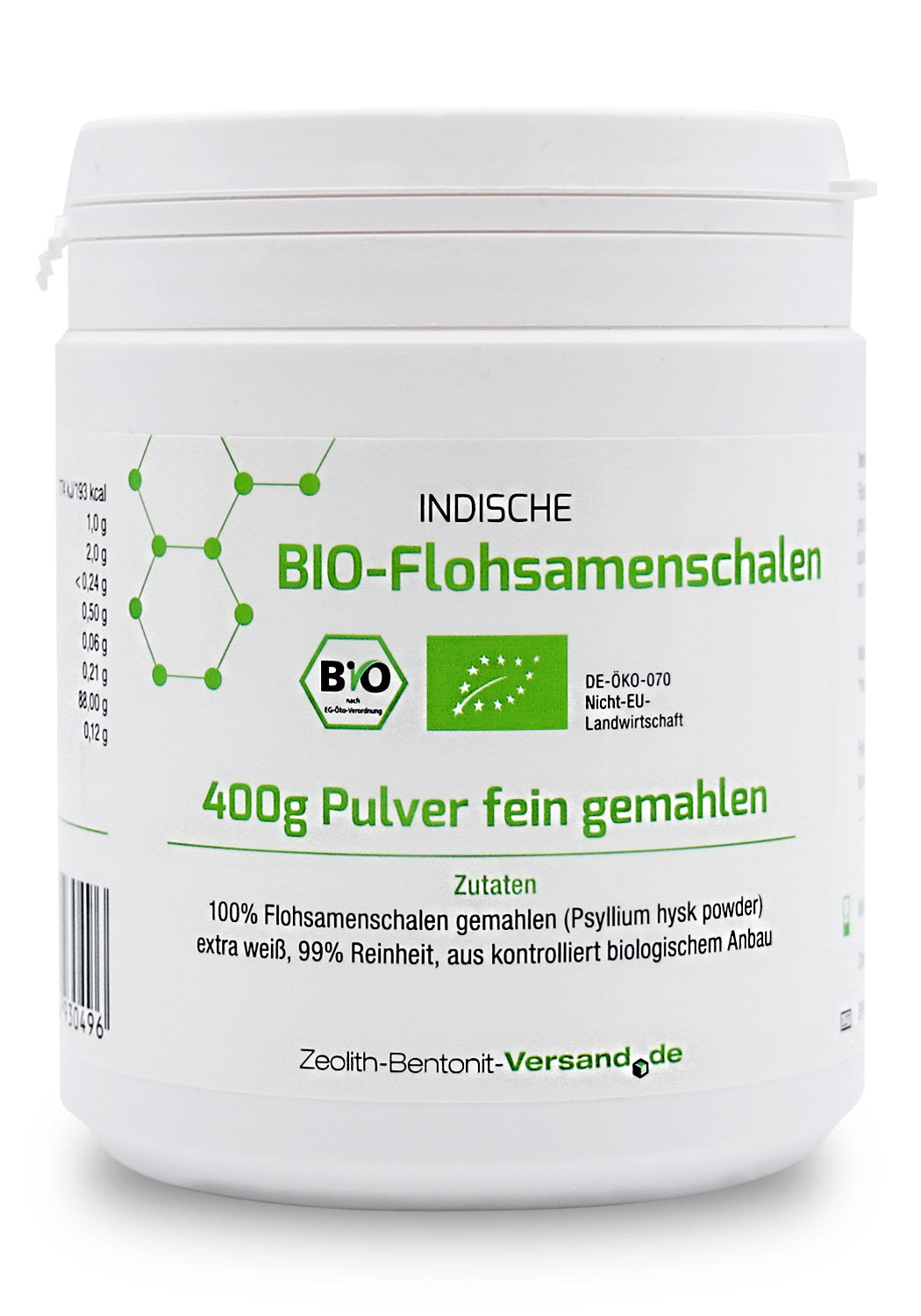
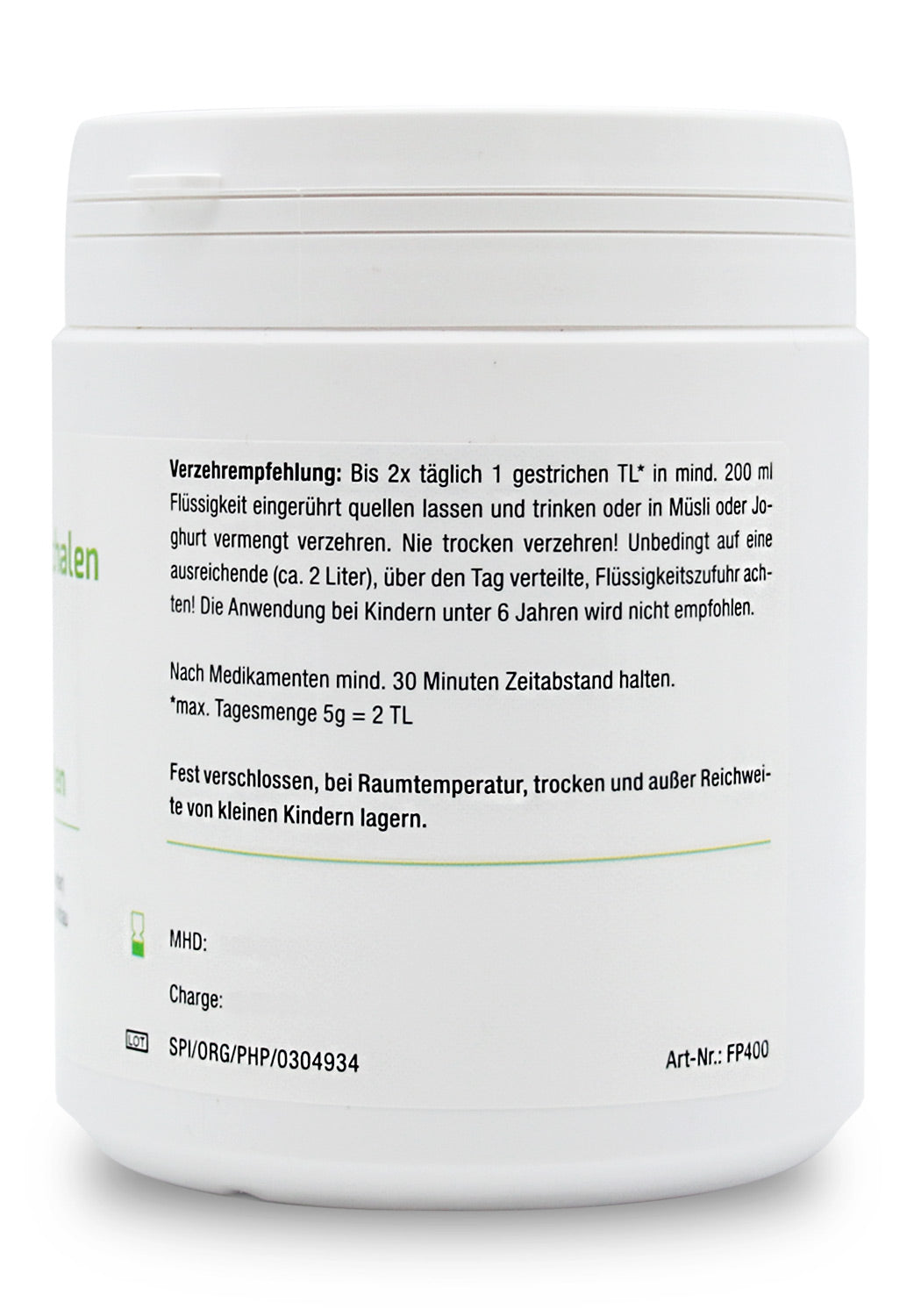
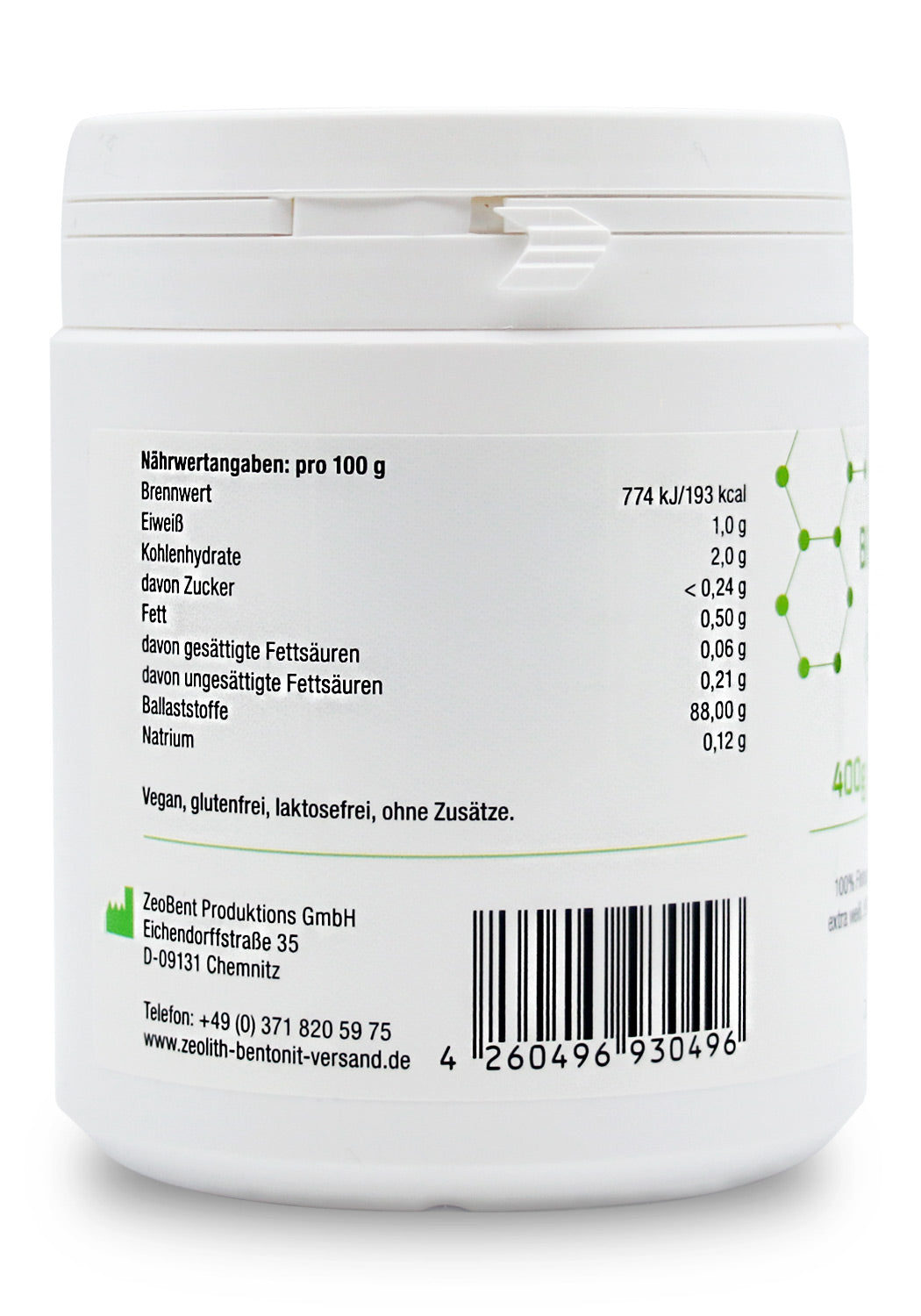
Indian Organic Psyllium Seed Husk 400g finely ground, DE-ÖKO-070
ab 2 zu je 22,54€ und Sie sparen 2%
ab 4 zu je 21,85€ und Sie sparen 5%
ab 6 zu je 21,16€ und Sie sparen 8%
Indian psyllium husks, a natural dietary fiber for intestinal cleansing
Psyllium is becoming increasingly popular to support natural digestion and promote intestinal health. As a purely plant-based food, they provide a high content of digestible and excellently swelling mucilage for cholesterol-conscious and fiber-rich nutrition. When in contact with water, swelling of the finely ground psyllium husks leads to a strong increase in the volume of the intestinal contents, which increases the stimulus on the intestinal wall, intensifies intestinal peristalsis and facilitates bowel emptying. Because of its stool-softening effect, Indian psyllium husk powder can contribute to intestinal cleansing with more pleasant intestinal transit and regulation of bowel movements.
psyllium husk powder from controlled organic cultivation
In contrast to conventional psyllium husks, the use of chemical and synthetic fertilizers and pesticides is prohibited for organic psyllium husks. They are also subject to strict controls by the organic regulatory authorities on site. Products from organic cultivation offer a lower allergy potential, as no flavour enhancers, artificial flavours or colourings or preservatives may be added to them before they are sold as organic food. Our Organic Psyllium Husk Powder is quality tested in German accredited laboratories and is available here as Organic Psyllium Husk 400g Powder Fine Ground and in Organic Psyllium Husks 200 Capsules.
- Product information
- Flohsamenschalen
Psyllium husk powder is more effective than psyllium husks and psyllium seeds
Psyllium seeds are the ripe, whole and dry fruits of various Plantago species. European species from Spain and southern France, for example, are known as psyllium plantain, shrub plantain and sand plantain. Due to their dark colour and origin, they are also known as ‘Black Psyllium’ or ‘French Psyllium Seed’. Psyllium seeds contain valuable, mucilage-forming fibre that swells on contact with liquid. The quality criterion that determines their value is their swelling volume, which depends on the mucilage content, among other things. The mucilage content of European psyllium seeds is between 10 and 12%.
Indian psyllium seeds are the fruits of the traditional Ayurvedic plant Plantago ovata Forssk and contain enormously high amounts of mucilage of 20 to 30%. They have a pale pink to beige colour and are also known as ‘blond psyllium’. The main areas of cultivation are western India (Gujarat) and Pakistan. Whole seeds have a swelling value of between 11 and 15, i.e. 1 g of seed absorbs between 11 and 15 g of water.
Indian psyllium husks are obtained by crushing and grinding Indian psyllium seeds and then separating the seed components by air separation. They are also known as ‘psyllium husk’. The swelling value of psyllium husks is at least 40 at a weight of 0.1g.
Psyllium husk powder is produced by grinding psyllium husks. As the soluble mucilage responsible for the high swelling properties is found almost exclusively in the psyllium husks, they swell better than whole psyllium seeds. Psyllium husk powder has the highest swelling volume. The swelling volume of our finely ground psyllium husk powder is at least 81 ml/g and therefore significantly higher than that of whole psyllium seeds, psyllium husks, wheat and oat bran, linseed, alginates, cellulose and pectins.
Psyllium husk effect & areas of application
- Psyllium husks: Overview of effects and areas of application
- How psyllium husks got their name
- Psyllium husks with multiple effects and good tolerability
- Application: how can psyllium husks be taken?
- Interesting facts about the nutritional value of psyllium seeds
- Historical background to psyllium husks
- Psyllium husks and their effect on the gut
- Psyllium husks and their effect on haemorrhoids and anal fissures
- Psyllium husk effect in the diabetic diet
- High cholesterol levels? Psyllium husks can provide relief
- Psyllium effect on constipation
- Psyllium husks for diarrhoea
- Intestinal cleansing, intestinal reorganisation and purification or detoxification with psyllium seeds
- Which psyllium husk effect is relevant for dieting?
- Take psyllium correctly and avoid side effects
- Psyllium seeds and their effect in veterinary medicine
- Indian vs. European psyllium seeds
- Conclusion | Psyllium husks have a versatile and health-promoting effect
- Individual references
Psyllium husks: Overview of effects and areas of application
Our particularly finely ground organic psyllium husks have an enormous swelling capacity and are effective for various complaints. Psyllium husks are effective as a regulating agent for diarrhoea (*1), but also as a gentle laxative for constipation. Psyllium husks are also popular as a weight loss aid, to improve digestion in the case of a low-fibre diet or simply for ‘intestinal care’. The positive influence on intestinal activity is based on the formation of larger quantities of stool, which is caused by the high swelling capacity of the psyllium husk powder and stimulates the intestines to become more active. Psyllium husks are obtained from the Plantago ovata plantain, which grows in India and Pakistan, and are not a new, but a traditional natural remedy for an active bowel. Here too, psyllium husks are a well-known household remedy for digestive problems and irritable bowel syndrome. The good effect of psyllium husks is based on the supply of valuable dietary fibre with high digestibility. The soluble fibre and complex mucilage promote the swelling properties and ensure that psyllium seeds absorb plenty of water, increase the amount of stool, improve intestinal activity and shorten the time the stool remains in the large intestine by making defecation more comfortable and faster.
How psyllium seeds got their name
Psyllium seeds have nothing in common with the animal of the same name, so this widespread assumption is unnecessarily misleading. The seeds of the mature plant jump upwards from the fruit capsule, which is reminiscent of jumping fleas and is thus responsible for the name. In German, the seeds of Plantago ovata are translated as flea seeds, without there being a direct connection to the less popular little jumper.
Psyllium husks with multiple effects and good tolerability
The main area of application is for intestinal problems and digestive disorders. However, psyllium husks can also be effective and a helpful supplementary food for many other restrictions and illnesses. The good tolerability of this natural product has led to psyllium husks playing an important role in gluten-free diets, for example. Due to the mucilage they contain, they are used as a binding agent in baked goods, fruit juices and muesli bars. The tasteless psyllium seeds have no effect on the flavour of the food or drink and are also well tolerated by people who are allergic to other binding agents, especially artificial ones. The good tolerability and the absence of many side effects are one reason why psyllium husks have become increasingly important in gluten-free and natural nutrition in recent years. Psyllium seeds are healthy and very well tolerated. They have hardly any flavour of their own and have a positive effect on intestinal activity. As they absorb water and thus swell, the psyllium husk effect is also valued in dietary nutrition. Psyllium has been known for centuries for its medicinal properties and has found its way from India and Pakistan to Europe. In times of superfoods and natural nutrition without artificial additives, psyllium seeds have experienced a boom and have long been part of modern healthy food with maximum tolerability. The beneficial effect on digestion goes hand in hand with important fibre and mucilage, which psyllium seeds contain in large quantities and in a tolerable dosage.
Application: How can psyllium husks be taken?
As psyllium husks develop their effect through the swelling effect, they are best taken with liquid or processed in food. As they have no flavour of their own, they can be taken in many different ways. Psyllium husk powder is usually stirred into liquids such as juices. However, they can also be combined with yoghurt and muesli. Taking psyllium husk powder in capsules is particularly practical. In the gluten-free diet, psyllium husks are often baked directly and used in cakes, bread or rolls or even in pizza dough. There are no limits to the variety of ingestion options and there is plenty of scope for combining the psyllium husk effect with a tasty food and releasing its positive properties.
Interesting facts about the nutritional value of psyllium seeds
The nutritional information corresponds to 100 grams of psyllium husk powder and is taken from official data. With a calorific value of 808 kJ / 193 Kcal, psyllium seeds are very low in calories and are therefore popular in dietetic nutrition. The fibre content is 83.69 grams and makes up the largest part of the nutritional information. Psyllium seeds also contain 2.38 grams of protein, 1.73 grams of carbohydrates and 0.55 grams of fat. The vegetable fibres are flosine mucilage polysaccharides, which are responsible for the intestinal stimulating effect of psyllium husks and bind more than 50 times their own weight in water. The low fat content is an important plus point, which is not only interesting for dieters. Protein and carbohydrates are important components of the diet and should be given plenty of attention as part of a healthy diet. Diabetics should know that 100 grams of psyllium husks correspond to 0.14 bread units. The main focus is on the mucilage, which is primarily responsible for the psyllium husk effect and is contained in very high concentrations. Indian varieties contain between 20 and 30 per cent mucilage, while plants from European cultivation contain between 10 and 12 per cent. The mucilage is technically known as arabinoxylans and is responsible for the soothing properties of psyllium, which enhance its effect. Flavonoids are also present and play an important role in the human immune system. The antioxidants ensure that free radicals are rendered harmless and, according to scientific studies, have a positive effect on the cardiovascular system. It is not without reason that psyllium husks are considered a superfood due to their effect and are becoming increasingly popular as part of a healthy diet.
Historical background to psyllium husks
A brief excursion into the origins of psyllium husks and their effects shows why this medicinal plant, which was originally used in India and Pakistan, is now known worldwide. Over 2000 years ago, psyllium husks were used by healers in India as a remedy for gastrointestinal complaints. Greek healers attributed a healing effect to the seeds for gout and ulcers, while Hildegard von Bingen swore by the psyllium husk's purifying and detoxifying effect. Plantago ovata is related to the better-known ribwort and broadleaf plantain. Today, the plant with the dense spikes is cultivated agriculturally and flowers between January and April, weather permitting. In colder regions, the flowering period shifts to the early summer months. In general, the development of the seeds, the flowering and the yield per plant depend on the amount of rainfall. Plantain needs a lot of water and therefore thrives best in rainy regions or with artificial irrigation. Today, psyllium husks are mainly obtained from agricultural cultivation, which is possible in all countries of the world with sufficiently fertile soil and optimal irrigation.
Psyllium husks and their effect on the gut
Digestive and intestinal problems are widespread diseases and are among the impairments suffered by the majority of humanity. The psyllium husk effect was confirmed by the European Medicines Agency in 2006 and is therefore considered certified and proven. Anyone suffering from irritable bowel syndrome can calm their nervous bowels with psyllium husks and improve their well-being. Flatulence and pain in the upper abdomen, a feeling of fullness and alternating diarrhoea and constipation are typical symptoms of irritable bowel syndrome. According to statistics, around one in five Germans suffers from these symptoms, which can be more or less severe, and can find relief by including psyllium husks in their diet and utilising their positive effects. In order for psyllium husks to unfold their effect and calm a restless bowel, the diet should also be changed. Certain foods and stimulants that strain the intestines and cause flatulence or indigestion should be avoided. The psyllium husk effect regulates intestinal activity on a natural basis and can be achieved without the need for chemical medication or the complete avoidance of favourite foods. The fact that psyllium husks are effective against diarrhoea and constipation is due to their high swelling capacity. It is therefore advisable to take the psyllium husks with plenty of liquid and preferably in the form of psyllium husk powder in a drink or yoghurt. Drink a glass of water afterwards, as the effect cannot be fully realised if you do not drink enough liquid, as the psyllium seeds cannot swell sufficiently.
Psyllium husks and their effect on haemorrhoids and anal fissures
Haemorrhoids are usually associated with intestinal problems, frequent diarrhoea or strong pressure when constipated. The consistency of the stool therefore has an important influence on the severity of haemorrhoids and can be positively influenced by the effective psyllium husk effect. Pain during bowel movements can be avoided and there is no irritation of the affected areas, which favours the regression of haemorrhoids and accelerates the healing process. Those affected can dissolve a level teaspoon of psyllium husk powder in water or yoghurt once or twice a day to optimise the consistency of the stool. To ensure that the psyllium husk has the desired effect, it should be taken with sufficient liquid. An additional glass of water is recommended so that the swelling agents can take effect and the positive properties of the psyllium seeds can fully unfold.
Psyllium husk effect in the diabetic diet
Diabetics need to be particularly careful with their diet and pay special attention to their blood sugar. For this reason, diabetics should exercise extreme caution when changing their diet, for example by taking psyllium husks. It is always advisable to consult a doctor before taking psyllium husks. One effect of psyllium husk that is relevant for diabetics is the delay in the absorption of sugar in the blood, or the reduction in the postprandial serum blood sugar concentration, which can be accompanied by a reduction in the amount of sugar absorbed. The pancreas is relieved, which can prevent hyper- or hypoglycaemia. It is highly recommended that diabetics consult their doctor before taking psyllium and find out whether a change in medication is necessary. In mild cases of certain diabetic diseases, the positive effect of psyllium husks in combination with a change in diet and physical activity may even mean that additional medication is not necessary. Consultation with a doctor is essential in order to make the right decision and not unnecessarily increase the risks of diabetes.
High cholesterol levels? Psyllium husks can provide relief
The body itself produces cholesterol, which is required as a component of cell walls and is known as cholesterol. In addition, cholesterol is also absorbed through the diet, where animal products with a high proportion of saturated fatty acids are among the largest suppliers. Other causes of an elevated cholesterol level can be due to hereditary predisposition or illness. High cholesterol levels are unhealthy and can favour secondary diseases, which ultimately require treatment and often lifelong medication. The psyllium husk effect occurs when the indigestible carbohydrates, fibre and mucilage bind the cholesterol and remove it from the body during digestion. It therefore does not enter the bloodstream, where it would increase blood lipid levels. A slightly elevated cholesterol level can be lowered very well with the help of the psyllium husk effect, without those affected having to take medication or give up foods such as butter and eggs.
Psyllium effect on constipation
When constipation occurs, many people resort to over-the-counter medication from the pharmacy. Taking laxatives can be harmful, especially if they are needed frequently or even permanently and in large quantities. Laxatives remove water from the body and can even lead to dehydration. The body loses minerals and sooner or later reacts with deficiency symptoms. If laxatives are used frequently, this can lead to a narrowing of the rectum and the need for surgery. Of course, frequent constipation is not pleasant and automatically leads to the search for a remedy. The effect of psyllium seeds on constipation cannot be denied. The increased stool volume, which is created by swelling the psyllium husks in plenty of water, stimulates and effectively supports intestinal activity. The psyllium husk effect is based on the increased filling pressure on the intestinal walls, which automatically acts in a natural way to transport the intestinal contents further and thus combat constipation. The mucilage contained in psyllium seeds increases the gliding ability of the stool and is another important factor in how psyllium husks develop their effect on constipation and contribute to easier bowel evacuation.
Psyllium husks for diarrhoea
Not only constipation, but also diarrhoea puts a lasting strain on the body. Thanks to their ingredients, psyllium husks have an effect on both constipation and diarrhoea. In both cases, the consistency of the stool improves due to the abundant absorption of liquid and the increased volume created by the high fibre content. Intestinal activity is activated and directed into normal channels, which improves diarrhoea and means that bowel movements are no longer a frightening challenge. The psyllium effect is gentle and effective. The supportive psyllium husk effect can also be helpful for chronic diarrhoea and irritable bowel syndrome. While long-term medication produces a habituation effect, this does not occur with psyllium seeds. Elderly people and pregnant women need not worry about their health, as psyllium seeds can stimulate natural intestinal activity at almost any age and in any life situation. Only children under the age of 6 are advised not to take psyllium husks. Conventional low-fibre diets are often accompanied by unwanted and unpleasant flatulence. This usually does not occur with psyllium, as psyllium is not broken down by intestinal bacteria and therefore does not produce any gas. The flatulence-free effect is particularly important in the case of diarrhoea, as it provides safety and reduces the risks of a combination of intestinal gas and diarrhoea.
Intestinal cleansing, intestinal reorganisation and purification or detoxification with psyllium seeds
In order to integrate the psyllium husk effect into a healthy lifestyle, you don't have to wait until problems arise before taking action. On the contrary, intestinal problems and other impairments can be prevented in advance if you pay more attention to your diet and also focus on the health-promoting effect of good dietary fibre. The effect of psyllium husks on intestinal cleansing and purification can be enhanced by taking them with plenty of water. Milk and dairy products do not have the same strong swelling effect as water, which is why a controlled intake combined with plenty of fluids is essential for a cure. Hildegard von Bingen already spoke favourably of psyllium husks, which have a beneficial effect on intestinal health. How do you cleanse the intestines with psyllium and how does it work? Anyone who is prone to indigestion, irritable bowel syndrome, diarrhoea or constipation is well advised to use Indian psyllium seeds. The same applies if the psyllium husks are to be used as part of a detoxification or fasting programme or during a diet. Here, psyllium husk powder is more suitable than whole seeds or psyllium husks, as powder is much more swellable and therefore more effective. Translated with DeepL.com (free version)
Depending on your needs, 1 to 2 level teaspoons of psyllium husk powder per day are sufficient for a detoxifying effect. Dissolve the psyllium husk powder in at least 200 ml of water. After this glass, another glass of water or tea is recommended to enhance the swelling effect and promote the desired psyllium husk effect. In general, a lot should be drunk in connection with the intake of psyllium seeds as well as during detoxification and fasting cures. Colon cleansing with psyllium husks can therefore also be an ideal support for detoxification and fasting cures. Translated with DeepL.com (free version)
Which psyllium husk effect is relevant for dieting?
Due to the enormous swelling and the nutritional and energy values, psyllium seeds are well suited for losing weight. The psyllium husk effect on weight loss is based on the fact that the psyllium swells in the stomach and creates a feeling of fullness. Even small amounts of psyllium husk powder have a strong effect. The feeling of hunger disappears without giving the body too much energy. Psyllium seeds can therefore occasionally be used as a ‘satiety supplement’ instead of carbohydrates. As the burning of energy is also actively promoted, the body draws on stored fat reserves. As part of a diet, the blood sugar-lowering effect of psyllium husks proves to be an advantage, as a stable blood sugar level reduces cravings and thus protects against the dreaded binge eating. The greatest risks when losing weight are based on an unbalanced diet, which promotes cravings and leads to fatigue and reduced performance due to deficiency symptoms. In order to achieve the optimum effect of psyllium seeds in the course of a diet, it is best to include a fitness programme in your diet plan that is tailored to your physical condition and sporting inclinations. The multiple psyllium husk effects provide excellent support when losing weight and motivate you to follow a healthy diet with an effective concept.
Taking psyllium correctly and avoiding side effects
Psyllium husks themselves rarely cause side effects and intolerances. Only very sensitive people can react to uncleaned seeds with slight skin or conjunctival problems. However, this is an allergic reaction and not a side effect caused by the psyllium seeds. Undesirable side effects can occur in connection with an overdose or otherwise incorrect intake. Due to their enormous swelling capacity, psyllium seeds require sufficient liquid to be absorbed. If too little water is supplied to the body, the swelling capacity of the psyllium husks can be restricted. After a glass of psyllium husks mixed in water, the effect can be optimised by drinking another glass of pure water or tea and supplying the body with sufficient fluids. It is important to consult a doctor in the case of known illnesses that are already being treated with medication. The doctor can not only provide information about the psyllium husk effect in conjunction with the medication, but also give individual recommendations on fluid intake and the intake of psyllium. Anyone suffering from a narrowed stomach or oesophagus or who has already been treated for an intestinal obstruction should be careful with psyllium husks and only consider taking them after consulting a doctor. Under normal circumstances and in the absence of previous illnesses or allergies, the desired effect will occur without any side effects or undesirable side effects.
Psyllium seeds and their effect in veterinary medicine
What is good enough for you could also prove useful for your animals. This theory also applies to psyllium, which is very helpful for digestive problems in dogs, cats and horses. The dosage should be chosen low and attention should be paid to sufficient fluid intake. To achieve the swelling effect and favour the positive psyllium husk effect, mix some psyllium husk powder and water into the wet food. When added to drinking water, very sensitive animals in particular may notice the change in the water and refuse to drink it. Whether an animal likes psyllium husk or not cannot be guessed in advance. Putting it to the test brings clarity and in most cases success. The treatment of digestive problems with psyllium husks has proved particularly effective for dogs and horses. Cats are a little more sensitive, which means that adding psyllium husks to their food can be problematic and cause them to refuse to eat. If this is the case, it was worth a try and should no longer be pursued. Otherwise, add some psyllium husk to the food every two to three days and provide a large bowl of fresh water. A long walk with the dog or a ride with the horse will be worthwhile, as thirst is guaranteed after returning home and fluid intake is thus ensured.
Indian vs. European psyllium seeds
Indian psyllium husks have a more intensive effect as they contain a higher proportion of important mucilage. At up to 30 per cent, they are higher than the European value, which is between 10 and 12 per cent. However, this also means that there are differences in dosage between Indian and European psyllium seeds. If you opt for Indian psyllium seeds with a particularly strong effect, you only need half the amount that you would need with the European natural product. It is therefore advisable to find out about the effect and origin of psyllium husks when buying them. The growing region must be labelled on the packaging. It also doesn't hurt to ask the retailer and remove any uncertainties. Indian psyllium seeds are considered to be particularly valuable, which is also reflected in the price. The mucilaginous texture has a quick and noticeable effect in the treatment of inflammation, heartburn and many other gastrointestinal disorders. However, when dissolved in a glass of water, Indian psyllium seeds as a swelling product are also more slimy in consistency, which can lead to rejection by sensitive people. In this case, it is better if the psyllium seeds are stirred into a more solid food such as yoghurt or used in baked goods.
Conclusion | Psyllium husks have a versatile and health-promoting effect
Psyllium seeds have a positive effect on the stomach and intestines, the immune system and general well-being. This natural remedy, which has been known since ancient times, has found its way into a conscious and healthy diet. Psyllium seeds can alleviate diabetes, diarrhoea and constipation, help with bloating and heartburn or soothe an irritated gastrointestinal tract. To utilise the ingredients of psyllium seeds optimally and effectively, it is best to use finely ground psyllium husk powder mixed in sufficient water. Alternatively, psyllium husks can also unfold their effect in yoghurt or fruit juices, although the swelling effect here is not as strong as in water. Therefore, the amount of liquid should generally be increased in connection with psyllium, which in turn has a positive effect on health and ensures an active bowel. Psyllium seeds are not a miracle cure, but a natural remedy that has been proven by research to regulate digestion and stimulate the bowels with a high proportion of mucilage and fibre. A sluggish bowel becomes more active and an irritable bowel is soothed, so that psyllium husks help with both diarrhoea and constipation. A major advantage of taking psyllium husks is that they do not cause flatulence and are a type of fibre that is not broken down by intestinal bacteria and therefore does not form gas.
Conclusion: For intestinal care, to support a diet or to soothe the stomach and intestines, the well-tolerated psyllium seeds are a good addition to a healthy diet.
Individual references
(*1)Book: Pharmacognosy - Phytopharmacy by Rudolf Hänsel, Otto Sticher, page 535, chapter 19.4.4, paragraph ‘Effect and application’. (Topics: General effects on the gastrointestinal tract)(*2)Date of publication Bundesanzeiger: 1 February 1990, issue number: 22a, ATC code: A06AC. Monograph BGA/BfArM (Commission E) Weblink:http://buecher.heilpflanzen-welt.de/BGA-Kommission-E-Monographien/plantaginis-ovatae-semen-indische-flohsamen.htm(Topics: General effects on the gastrointestinal tract, side effects)(*3)Book: Pharmacognosy - Phytopharmacy by Rudolf Hänsel, Otto Sticher, page 537, table 19.14 (Topics: General effects on the gastrointestinal tract)(*4)Book: Immunology for beginners by Lothar Rink, Andrea Kruse, Hajo Haase, page 217, chapter 15. 3 (Topics: The immune system and flavonoids)(*5)Dissertation: Der Einfluss des Flavonoids Phloretin auf die Thrombozytenaktivität und die Aggregationshemmung von Carola Güther, Jahr 2008 im Fachbereich Medizin - Innere Medizin, Note: 2,0, Charite - Universitätsmedizin Berlin, Seite 1 (Topics: Herz-Kreislauf Erkrankungen und Flavonoide)(*6)http://www.ema.europa.eu/docs/en_GB/document_library/Herbal_-_Community_herbal_monograph/2013/07/WC500146770.pdf(Topics: General effects on the gastrointestinal tract, anal fissures, haemorrhoids, cholesterol)(*7)Book: Textbook Phytotherapy by Volker Fintelmann, Rudolf F. Weiss, 2009, Table: Heilpflanzen im Überblick (Topics: General effects on the gastrointestinal tract, irritable bowel syndrome)(*8)Book: Textbook Naturheilverfahren by Martin Adler, Chapter 12.3.23 (Topics: Psyllium husks for diabetes, lowering blood glucose concentration, cholesterol)(*9)Book: Die Ernährungs-Docs - Diabetes: Mit der richtigen Ernährung Diabetes vorbeugen und heilen by Dr Matthias Riedl, Dr Anne Fleck, Dr Jörn Klasen Recipe: Creamy and creamy food for diabetes. Jörn Klasen Recipe: Cream cheese chia rolls (topics: Recipe for diabetics with psyllium husks as an ingredient)(*10)Book: Praxis-Lehrbuch Heilpflanzenkunde: Grundlagen - Anwendung - Therapie by Ursel Bühring(*11)Schauder, Pauline; 2021; Psyllium husks - superfood and remedy
